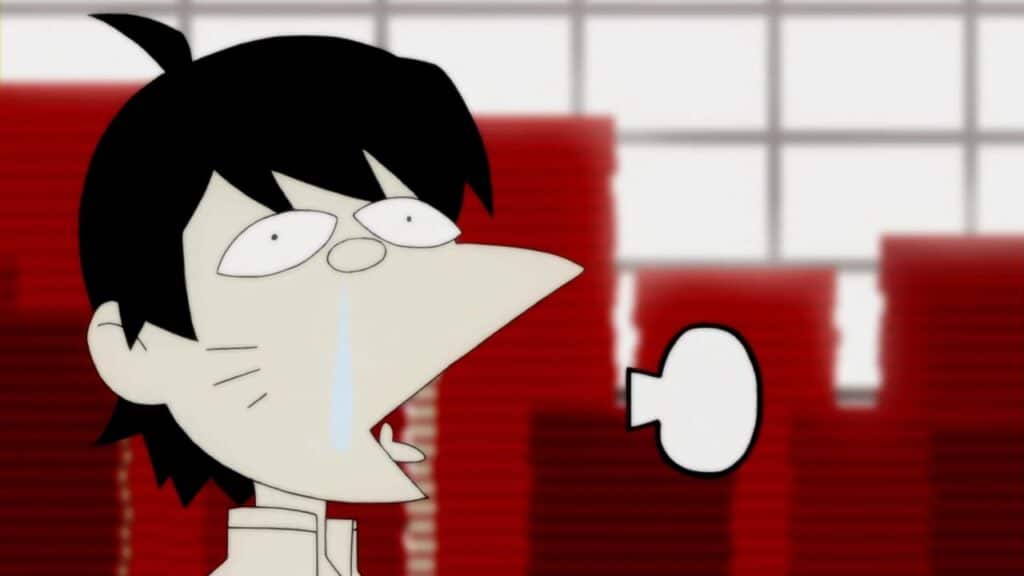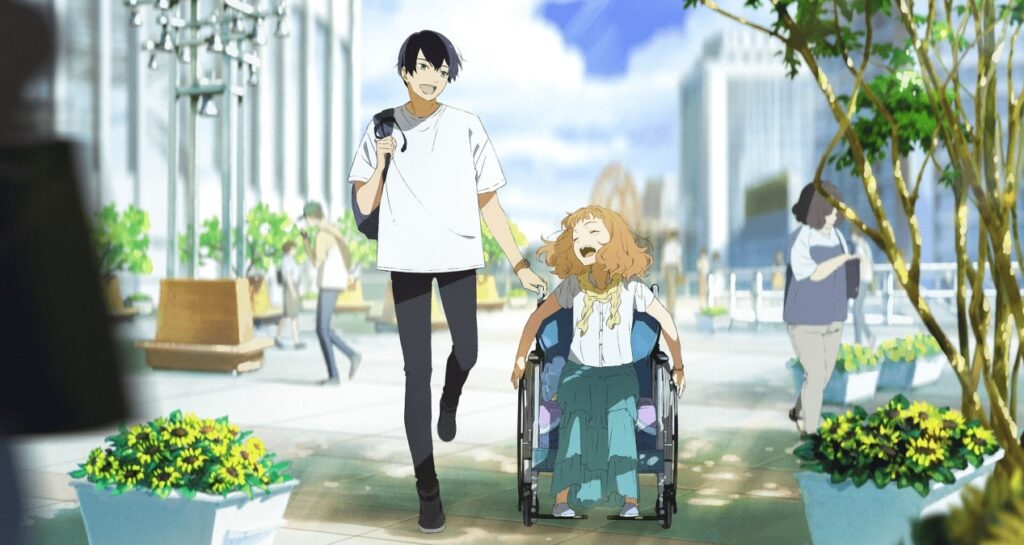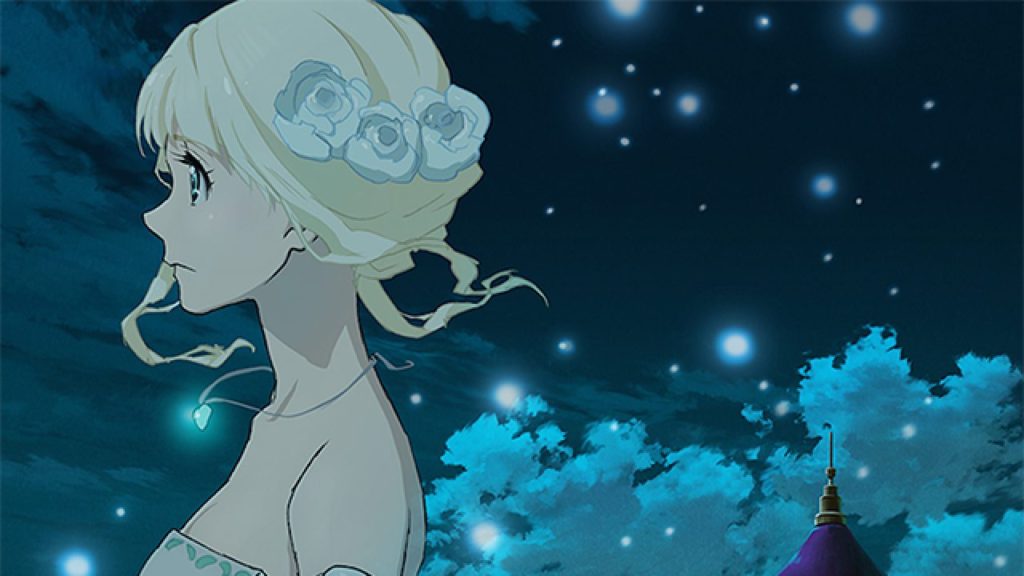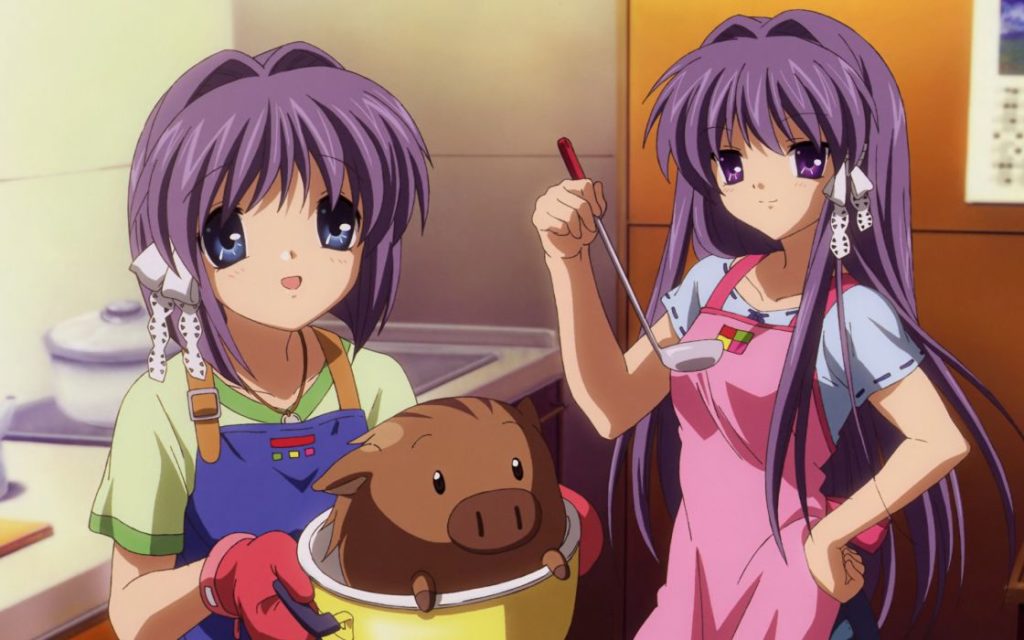Dialogue-dense anime certainly isn’t for everyone, and it certainly isn’t for those who watch with subtitles and have slower reading comprehension. Sometimes you want to watch two brutes slug it out rather than listen to two dudes have an increasingly tense conversation about the ongoing events of the world.
However, for those that enjoy anime with a lot of dialogue, they enjoy it when it is also well done. We aren’t talking about anime that sloppily spills out its plot in tedious explanations and exposition. Dialogue, when done well, can be just as interesting and engaging as moments of action when properly crafted.
These dialogue-dense anime, well, they know how to do it right. If you are looking for anime with a lot of talking, and anime that knows how to do dialogue in an engaging way, give these anime recommendations a try.
Dialogue-Heavy Anime
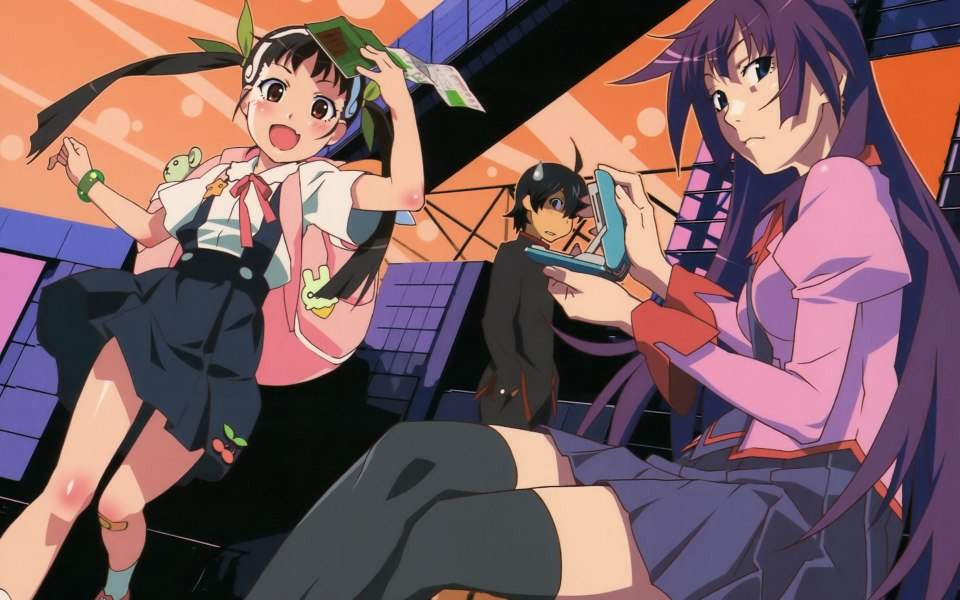
Bakemonogatari
Bakemonogatari is the anime that really defines the term “dialogue-dense.” This is because the times where there is not a full paragraph of subtitles for you to read on the screen seem pretty sparse, which is a shame, because Bakamonogatari also has unique and compelling visuals as well.
While the series is where your reading speed and comprehension skills go to get humbled, it isn’t just throwing dialogue at you for no reason. Their lengthy narratives all go to build out the story at hand and the characters involved, which is pretty impressive considering that when stripped down to the bare bones, the Monogatari franchise is just a supernatural harem anime.
What really allows the series to wedge in so much chatter in is that the Monogatari franchise is told non-linearly and the series feeds you clues as to the timeline of things through casual conversation. You will hear some off-handed mention of interesting events that you haven’t seen, and the dialogue paints them as things you will come to learn later in full. It all serves to make the series engaging, and its how you end up binge watching 20 episodes in a day and still hear them talking even when you close your eyes to sleep.
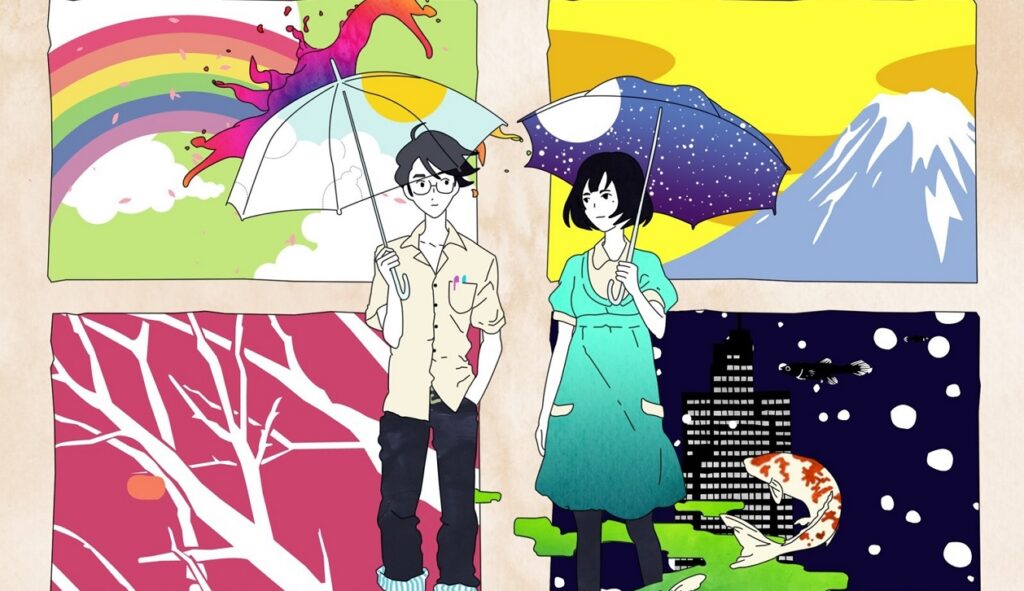
The Tatami Galaxy
Until Bakemonogatari came along, The Tatami Galaxy confidently held the number one spot of the most verbose anime where they characters seemingly never take in a moment of silence.
The series follows a man who, after failing to have the happy university life he wanted, gets a chance to redo it it. Actually, he gets many chances to redo his college experience and try to earn the love of one woman in particular, but constantly screws it up for one reason or another.
So between him grasping at the concept of perfection and him being entirely bitter by the results of that impossible quest, the main character reflects quite a bit. So when he is not talking to people, his inner monologue is running faster than a meth-head with anxiety,
This series is one for those who enjoy their artistic anime with its thought-provoking themes and imagery. However, it is not only artfully put together, but it was artfully written as well, inviting you to reflect on it even after it is over.

Katanagatari
For a series whose entire plot is “go collect these swords,” and whose every episode is about the characters trying to collect a sword from the person wielding it, Katanagatari sure is talky.
However, as the name might suggest, Katanagatari shares an author with Bakemonogatari, though they are unrelated to each other aside from the on-the-nose way they are named.
While Katanagatari is built around a premise more conducive to action, the author is still one who enjoys to use words. So you get a lot of cool battles, but the characters are still wedging in a lot of dialogue. You will come to enjoy the characters not just for their battle styles, but for the witty repartee and good chemistry between them.
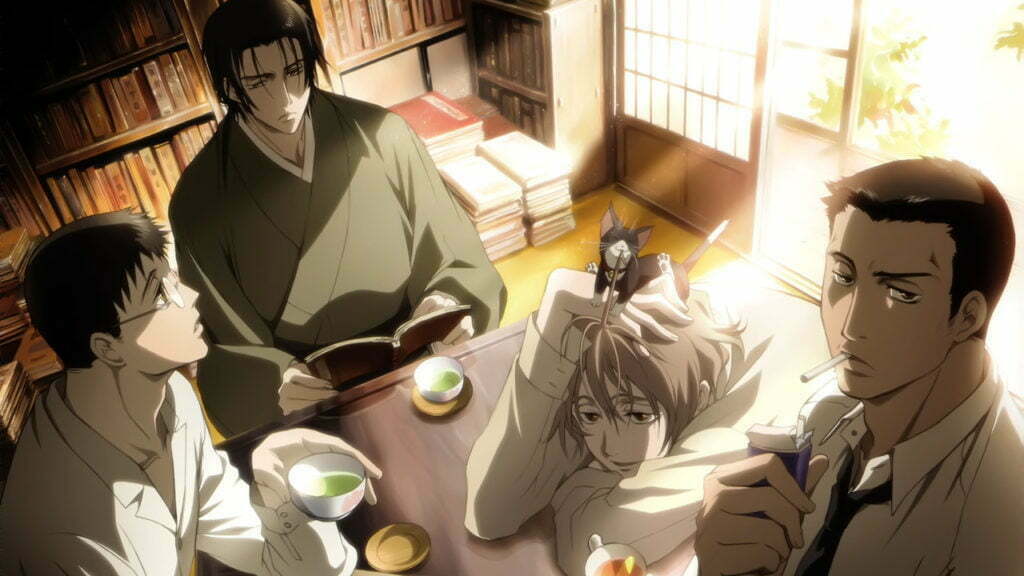
Box of Goblins
Over the years, I have found that trying to concisely summarize the plot of Box of Goblins is an exercise in futility. It is a mystery series whose complexity gets so dense that you may find moments in the series where, even when paying full attention to it, you simply don’t know what is going on.
All of that is compounded by non-linear storytelling and some pretty dense metaphors. It gives you this “confusing but in a good way” mystery that is essentially about investigating a serial killer that dismembers women and leaves them in a box.
Like many a good detective mystery, there is quite a lot of talking as they try to put the pieces of this puzzle together. However, it isn’t just a detective mystery either. There are quite a few storylines at play that all feed into the mystery of it, leaving you curious as to how these characters come into play later.
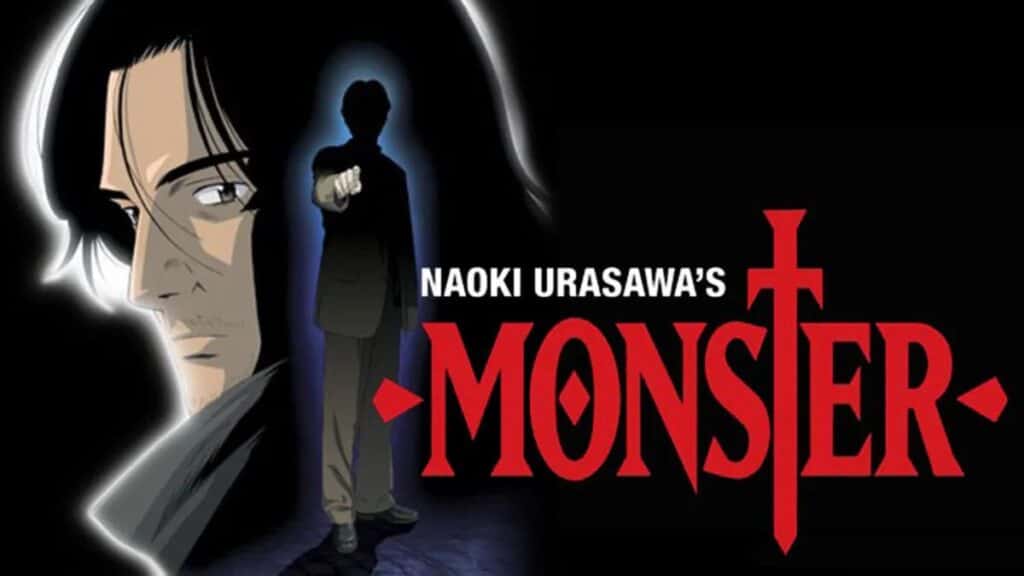
Monster
Anime fans may not realize it, but anime doesn’t actually do series suspense all that well. It has tried a number of times, but it often feels like each series ends up playing their hand too early and completely unravels the tension for what remains. However, Monster, though well-aged now, still sits at the pinnacle of one of the best examples of suspense done in anime.
Monster follows a doctor who realizes that all the deaths happening around him that suspiciously point to him as the culprit have to do with a young boy whose life he saved even at risk to his career many years earlier. Because he feels responsible for saving the life of this killer when, if he had chosen differently, he would have died, he gives up his own life to try and stop him.
Monster is a slow burn and sometimes it feels so slow that you should be bored, but you are compelled by the completely normal characters that are all getting pulled into this mystery. Every arc serves at least some purpose to feed you more information about the mysterious antagonist and his complicated past. Sitting through rather low tension arcs makes the intense ones feels all the more rewarding.
Monster is considered one of those anime masterpieces, and it is considered that for a good reason. For those that enjoy both dialogue-dense anime and anime grounded in reality, it is a fantastic ride.
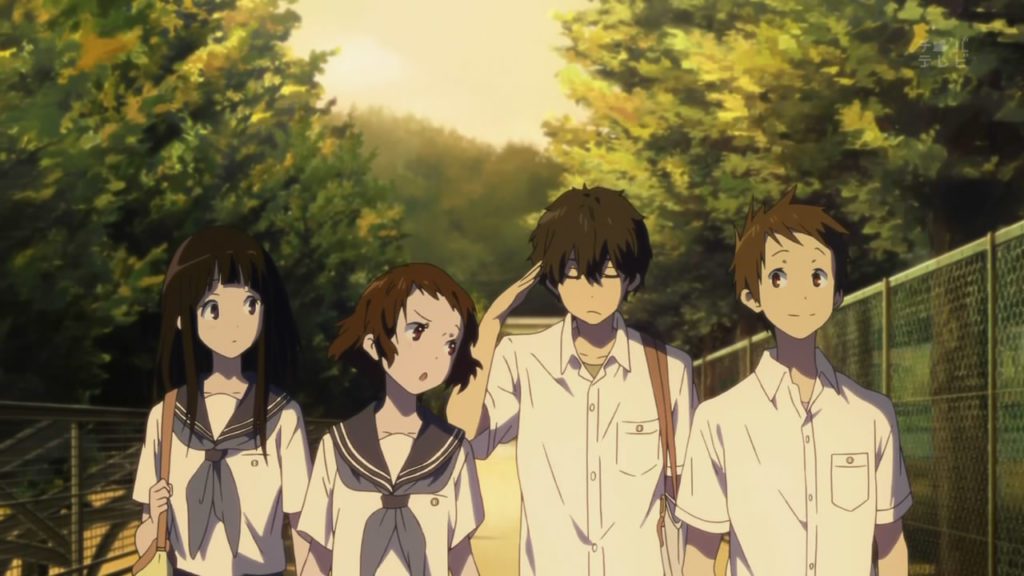
Hyouka
At a glance, you think Hyouka and its plot of a literature club that constantly ends up investigating supernatural school mysteries is a pretty usual set up. There are probably at least a dozen other anime series with the same set up, but if nothing else, Hyouka is clever.
It cleverly sets up little mysteries that seem pretty supernatural, but the series still lives in our boring reality where the actual explanation is delightfully mundane. However, the way they investigate and explore these mysteries, combined with the chemistry between the characters doing so is what keeps you coming back to Hyouka even after you know that there is no supernatural at work here.
Alongside amusing exchanges between the apathetic main character and the endlessly curious girl that has caught his attention, Hyouka enjoys wandering off into long diatribes about the mystery at hand. It is a series that uses its dialogue as exposition for these mysteries, but in doing so is going over the character’s knowledge of events and how certain things can come off as supernatural in origin.
Dialogue used as an info-dump is often called lazy writing, but those moments are only painting the conclusion to the mystery for all to see. You got all the pieces previously, and it is making sure you lined them all up correctly.
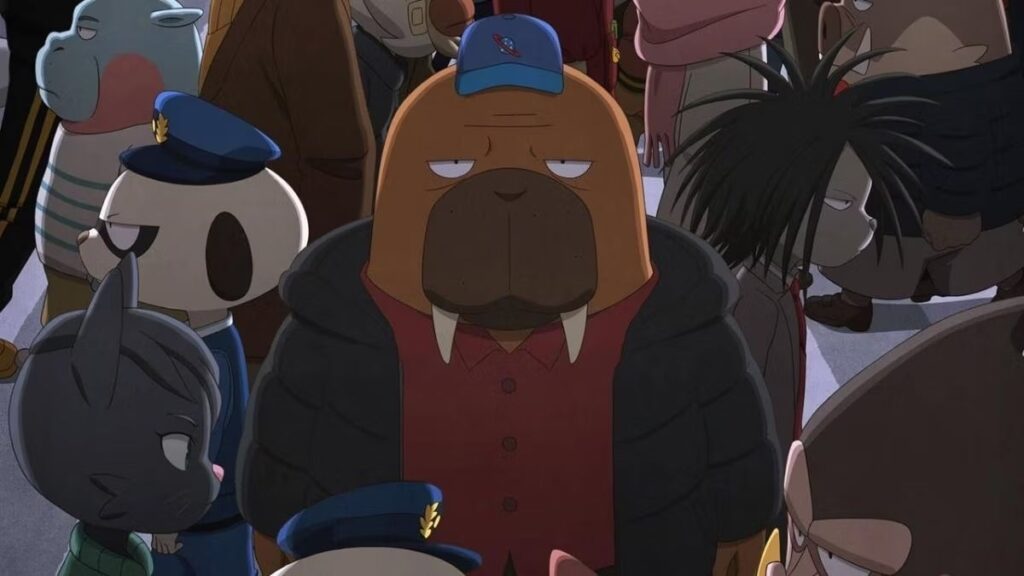
Odd Taxi
Mystery is a popular genre when it comes to dialogue density because clues to a mystery are often harvested through talking to people. Odd Taxi is a murder mystery, but told through the viewpoint of a somewhat uninvolved taxi driver. He gave the victim a ride before she died and now has become embroiled in the investigation of her death.
The series is often about the main character just listening to people as they go off on long tangents. He’s not much of a talker himself, but he’s a good listener, and just good enough of a conversation partner to bring out little clues as to what is happening in the world.
This series is excellent at creating interesting characters made interesting almost purely through what they say and investing you in wanting to see how they are involved in all this.
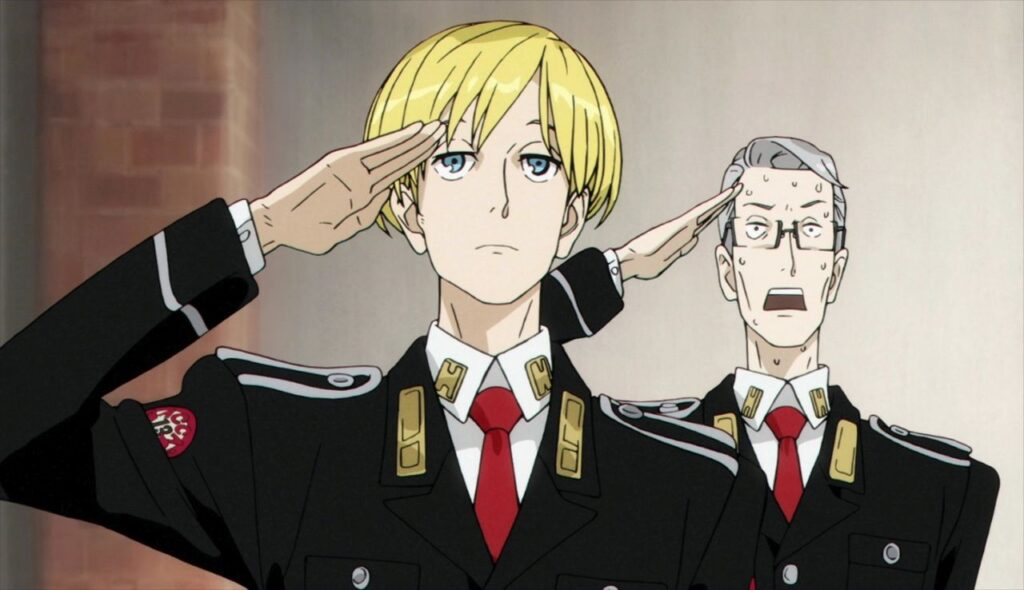
Acca 13
Acca 13 is one of those underrated anime series that very few people watch or really talk about, but most people who did watch it really enjoyed it. It manages to tell a complete story in one season about a growing political coup plot without actually really having any action.
The series follows an island kingdom of 13 diverse states. For almost a century after a revolt, a civilian organization called ACCA oversees the public works and fosters peaceful coexistence between these individual nations with different traditions and cultures. The story proper follows an inspector in that organization who travels and begins to hear rumblings of another coup building after the current king grows ill and his irresponsible, ill-liked son eyes the crown.
The problems in this series aren’t really solved through violence. They are solved through dialogue and clever political maneuvering to keep the general masses happy and prevent unrest. It would have been easier to start executing people, but Acca chooses to use words and compromise.
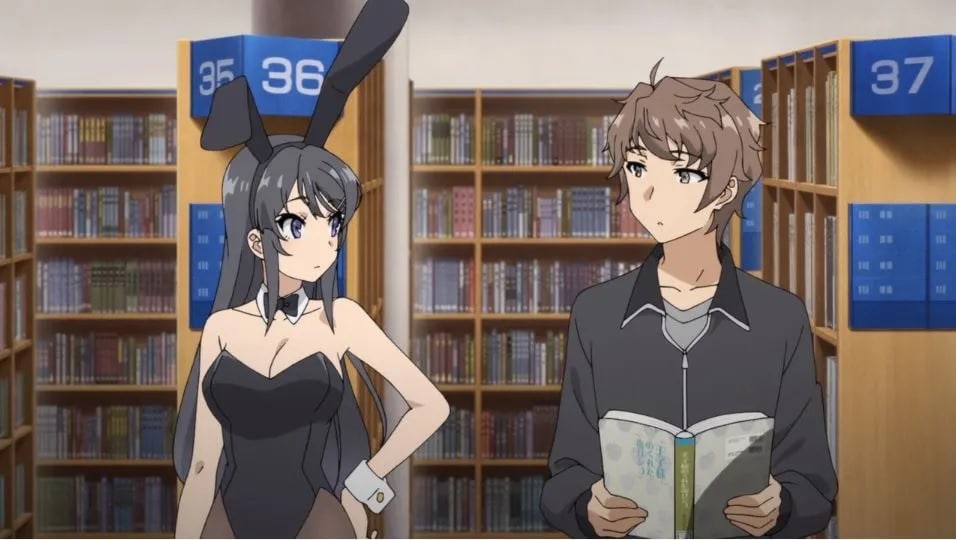
Rascal Does Not Dream of Bunny Girl Senpai
With the title, you expect Rascal Does Not Dream of Bunny Girl Senpai to be a standard rom-com, if not an ecchi rom-com. While Rascal Does Not Dream of Bunny Girl Senpai is a rom-com, it only really has rom-com elements. The series has a non-romantic story that it wants to tell outside of those dopamine-releasing relationship moments that romance anime fans are looking for.
Instead of just another rom-com, you get a surprisingly dialogue-dense anime that enjoys lengthy narratives. Sometimes you are listening to the characters have charming and witty conversation with each other, sometimes you are listening to lengthy inner monologue of the main character thinking about people that he is trying to help.
They are all written in such a way that it never feels like a chore to sit through all that dialogue, which is good, because the talking is really like 80 percent of this anime.
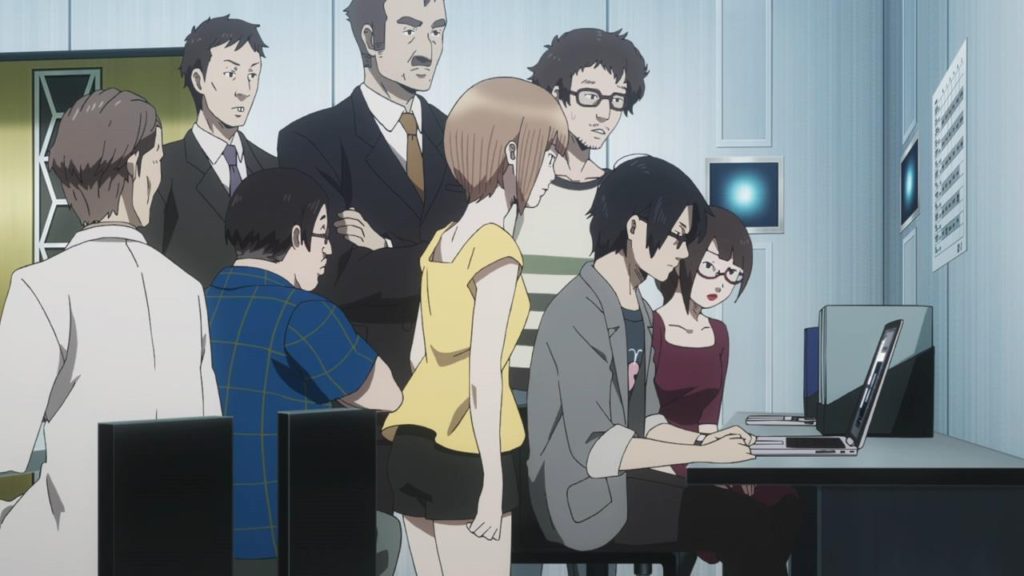
The Perfect Insider
You can always trust that mystery anime based on Japanese novels will be very verbose. After all, mystery is all about creating intrigue, and when you are doing that in a book, it is usually done through the dialogue.
The Perfect Insider takes place on a remote island involving a mystery that three characters become caught up in. The series follows a professor and his student going to the island for a vacation, only for it to be derailed when a strange corpse shows up at a lab on island. This also leads them to a recluse that has been living in that lab for over a decade.
You are intrigued by the corpse, and that intrigue increases when introduced to the quirky and suspicious characters. However, this is one of those mystery series that enjoys going off into long dialogue-driven rambles that always seem to end up at philosophy. It invites you to do quite a bit of thinking, but also thankfully breaks up all of that heaviness with some dark comedy as well.
This series is what many would call “artistic” or perhaps “experimental,” which are often just fancy ways of saying “not a lot of people watched this,” but for a mystery, it does everything you want it to do.
It lays out clues in a way that ranges from “very obviously a clue” all the way to those beloved clues so obscure you only realize they were something after the mystery is solved. In doing this, it gives you ways to examine the mystery yourself so you aren’t just left waiting for it to be spelled out for you.
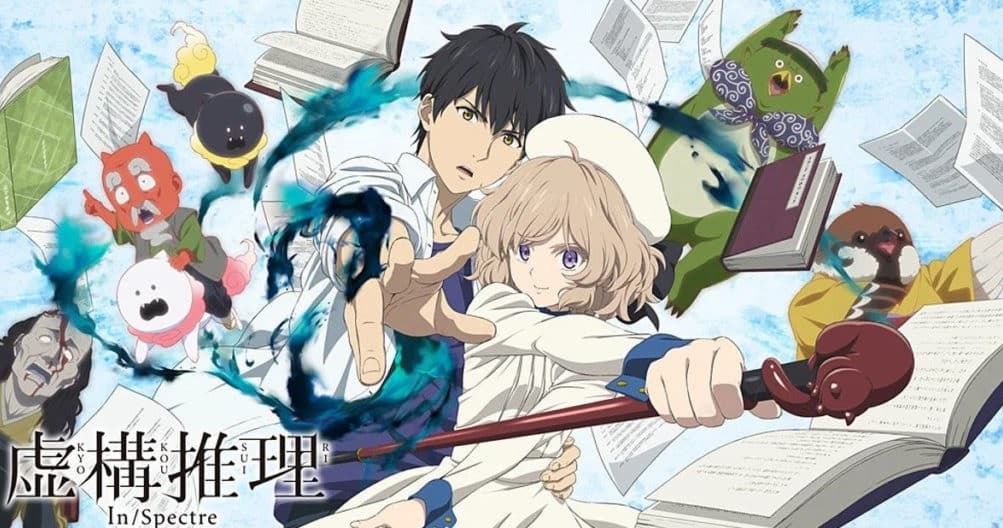
In/Spectre
When it comes to supernatural series involving actual spirits. You expect either a shounen battler or a pretty chill slice of life anime. In/Spectre sort of broke that expectation by being just a little bit of both.
To be fair, In/Spectre told us what it was right in the beginning. It was about a girl who was made a god by the spirits in order to mediate problems between the spirit world and the human world. However, anyone well-versed in anime thought “mediator” meant someone who solved problems with violence rather than being an actual mediator that talked things out.
That’s what the series is about. She is a mediator, she solves mysteries by thinking them out and talks out problems with spirits while her immortal assistant that she also made her unwilling boyfriend keeps her safe. The action isn’t the selling point here like it is with supernatural shounen battlers. This series is mostly about talking through mysteries until they reach a solution.
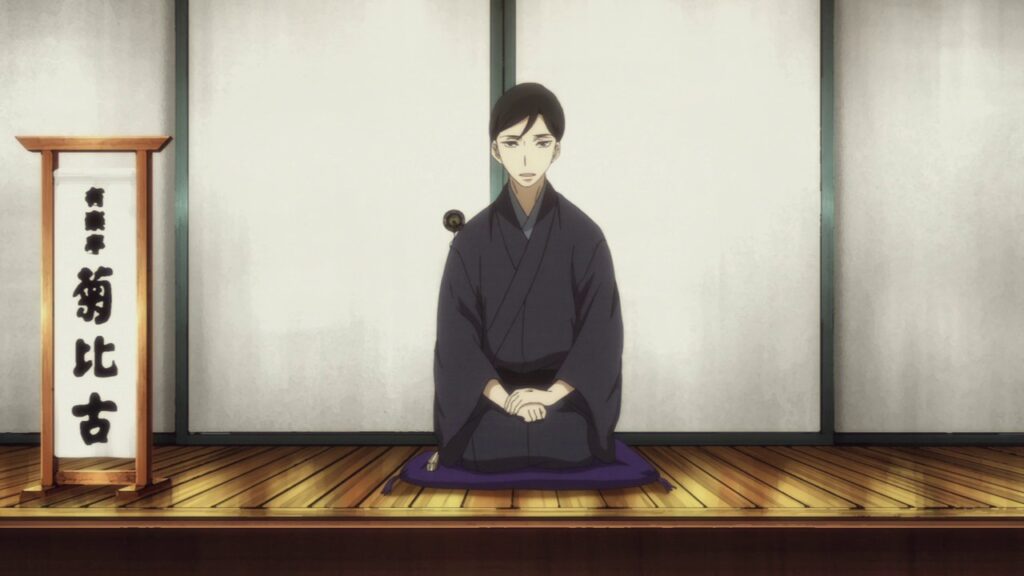
Shouwa Genroku Rakugo Shinjuu
If you go back far enough in any culture, you will find that there was once a profession for telling stories. Back before we had all this modern entertainment, listening to people tell stories was the entertainment, and even now, you know a good storyteller when you hear one.
Shouwa Genroku Rakugo Shinjuu is a drama anime about Rakugo, a form of comedic storytelling. While the series starts about an old master of Rakugo getting an apprentice, most of the story is about the past of that old master, telling of his Rakugo dreams and aspirations that he shared with his now-deceased friend and Rakugo peer.
This series is unique in that it showcases a lesser seen period in Japanese history by being set in the post-War era and, as it goes on, the “post-post-War” Shouwa era. It was a time of struggle and also growth, shown off perfectly as its highlights the highs and lows of people training in this older art form.
However, the drama here is more about the personal relationship between the two very different men. Punctuating the personal drama are periods where these two men ply their craft, so you get to enjoy the long, one-man-show-style stories that are Rakugo performances.
The stories are clever and funny if you can keep up with them, but following the story they are telling can be a bit difficult because of the quick pace and the wit that some stories employ.
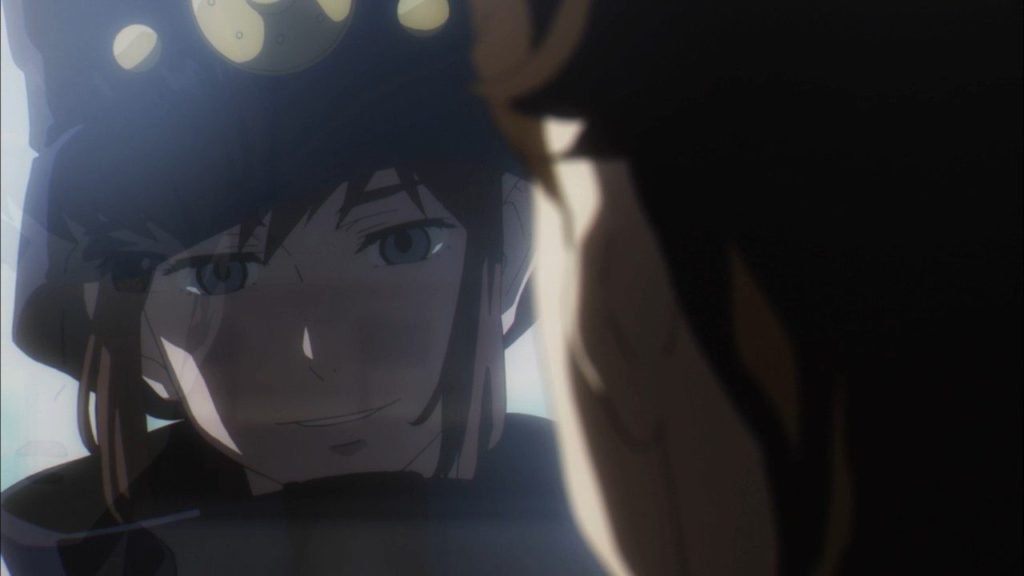
Boogiepop Phantom
Boogiepop Phantom, put into simplest terms, is one of those anime series that is hard to explain. Episodic and non-linear, it tells a number of short stories in a city all surrounding a mysterious supernatural entity known as Boogiepop. What are they doing there? What purpose do they serve?
The series is a mystery anime and being hard to explain is kind of a boon for mystery anime that lean hard towards mindfuckery at times. Regardless, much of the series is fed to you through dialogue. Occasionally, you might get to see a murder or some symbolic imagery, but mostly you will be trying to unravel things by listening to endless conversations.
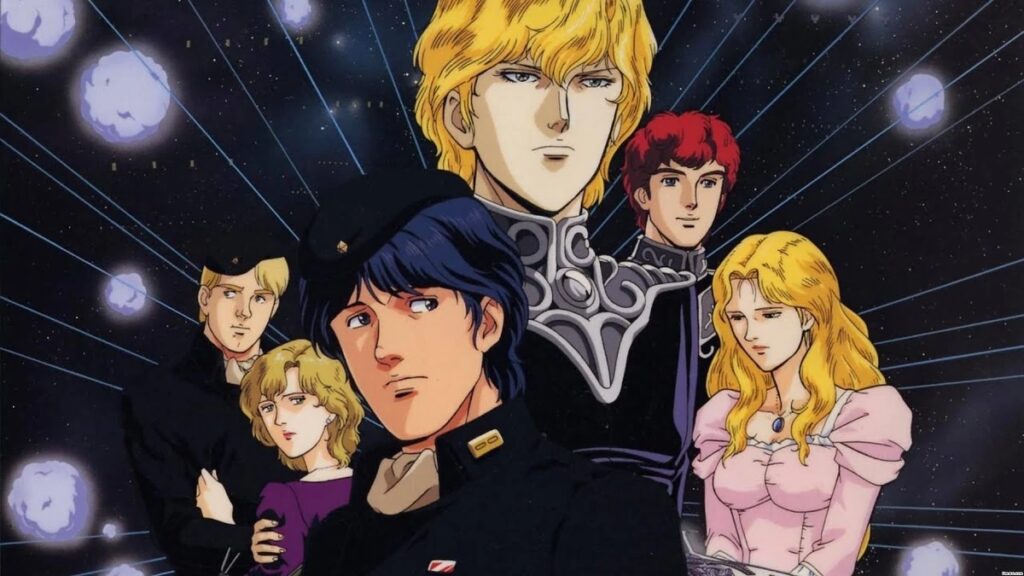
Legend of the Galactic Heroes
Because it is a space opera and so many Gundam series are also space operas, Legend of the Galactic Heroes tends to be lumped in with Gundam as another “giant robots fighting in space” anime.
And yes, Legend of the Galactic Heroes does have some giant robots fighting in space, but you can think of it as a sort of reverse Gundam, in a way. Whereas Gundam often puts on emphasis on many battles with some moments of lengthy dialogue, Legend of the Galactic Heroes does the opposite.
The series enjoys alternating between battle episodes and episodes that are just characters on one of the two ideologically-opposing sides talking politics or about military strategy. The more the series goes on, the more prominent the long moments of dialogue become.
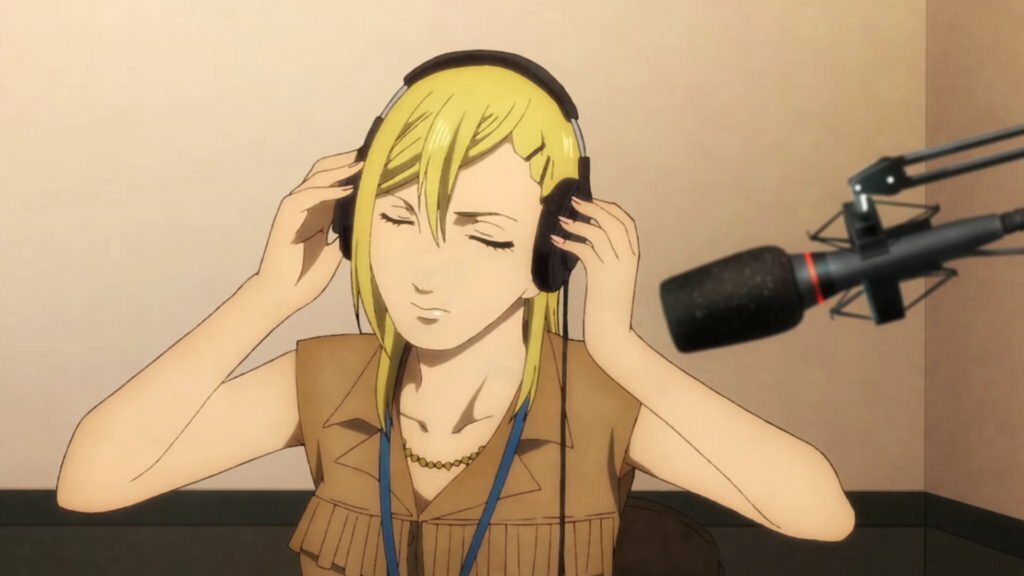
Wave! Listen to Me
Wave! Listen to Me is in an extremely similar vein to Shouwa Genroku Rakugo Shinjuu. In fact, you could say that Wave is kind of a modern version of Rakugo in which people are telling stories over the radio in Wave instead more structured comedic stories in a theater like in Shouwa Genroku Rakugo Shinjuu.
Regardless, Wave is a lot of talking. Or rather, Wave is a lot of complaining. The main character lives her life and then voices her frustration over the airwaves. It is one of those comedies that you enjoy more for how relatable the characters are rather than the absurd shenanigans.
Do you know more anime that are heavy on the dialogue? Let fans know in the comments section below.
